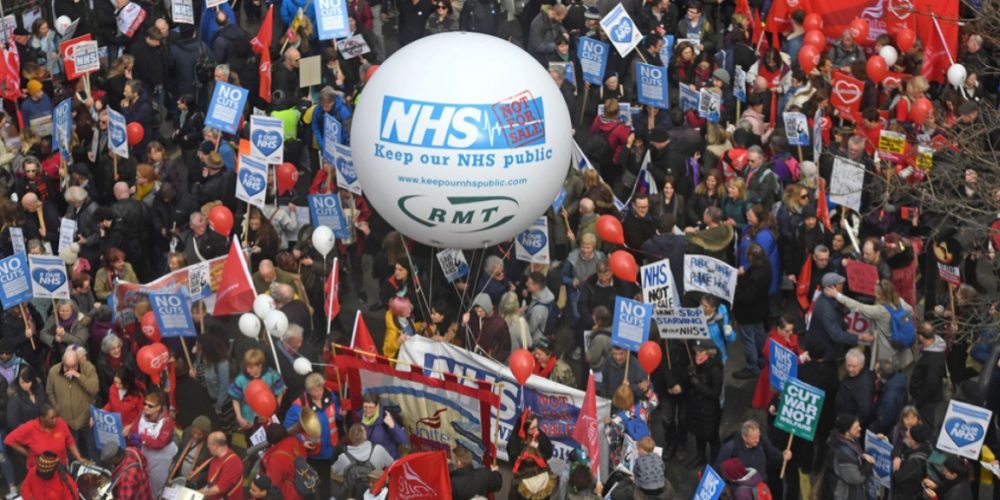With the mainstream of the Democratic Party in the United States beginning to get behind Bernie Sanders’ “Medicare for All” policy, it brings a sharp focus to how this sort of policy is financed.
That such a policy could be gaining traction in the United States, especially in its current Trumpian political climate, shows that there is no innate anti-chauvinist or anti-capitalist principle attached to a universal health service. Such a health service is required to be of a certain character, not just universal, in order to be anti-capitalist.
This is particularly relevant in the realms of Irish political action because of our proximity to Britain. As the DUP hold the balance of power in the British parliament, Britain has rediscovered the failed northern Irish statelet. This has led to a number of well-meaning (and not-so-well-meaning) commentaries on the situation in the North, including the expansion of abortion rights to people living there—but only if they can obtain access to it through England, Scotland, or Wales.
This has seen the “benevolent” British liberal Tories and the British Labour Party lauded in some quarters for deigning to bequeath abortion access to the poor benighted Irish; but it shows the NHS for what it is. It is an imperial construction, primarily for the benefit of imperial citizens. The fact that it can be captured and dictated to by as regressive a force as the DUP shows how it poses no ideological barrier to the worst revanchist or sectarian forces—and the fact that it becomes the domain of the British to expand or vindicate rights on their whim shows the NHS for what it is.
The concept of labour aristocracy is a well-worn one, but it fits here. The spoils of imperialism are used to buy off the imperial core’s working class, elevating them to a level above where they would be in a market where their own labour power relative to capital was the only determinant of remuneration. But yet it is defended. The British left is now in a purely defensive struggle, to hold on to the NHS and protect it against privatisation; to see pay increases for junior doctors and nurses.
In the much-vaunted post-war consensus the Labour Party’s welfare state was built, but the state was essentially bankrupt following the Second World War. To pay for the swelling social costs, it saw Britain intensify its colonial interests throughout South-East Asia as well as growing ever closer to the United States, which was its main financier at the time.
That “special relationship,” which persists to this day, saw the murder of Greek communists in 1945 and the invasion and destruction of countless countries since—first in the name of Cold War and now in the name of fighting terrorism.
The link between the NHS and imperialism is clear when we remember that prescription charges were introduced within the NHS after the intensification of the costs of the Korean War. That also prompted Britain to demand a loan of £750 million from the colonies—which they had no choice but to accept—to keep the British exchequer afloat.
Even today, as the NHS is systemically underfinanced to force its privatisation, it is Britain’s position as an imperialist aggressor that keeps its economy afloat, and its health system paid for.
As communists, surely we should be struggling for better than a more progressive redistribution of imperialism’s spoils. Even the so-called revolutionary left in Britain does not grapple with the continuing link between the NHS and the imperialist nature of the British state. But how could it be otherwise? The British state is fundamentally imperialist, and the institutional offshoots of that state are therefore required to be imperialist in character, in order to maintain that order.
Rather than looking on the NHS as a model to be followed—or, even more pressingly, viewing it as something to be extended south in the event of a 32-county worker’s republic—we need a health service that is fundamentally anti-capitalist, that struggles against the contradictions inherent in capital, and that operates to raise up our class, in conflict with the ruling class.
But such a thing would necessarily come into conflict with the power of the pharmaceutical industry, the hegemony of the psychiatric industry’s incarceration policies, and the entire capitalist-medical complex. Medicine and “wellness” has never been more branded.
We can look to Cuba for examples of a good community-based health system; but, with a different population profile and low population density, we need to think to ourselves, what does a socialist health system look like in Ireland? Hopefully it will be one that places us firmly outside Britain’s and the EU’s imperialist vampirism.






